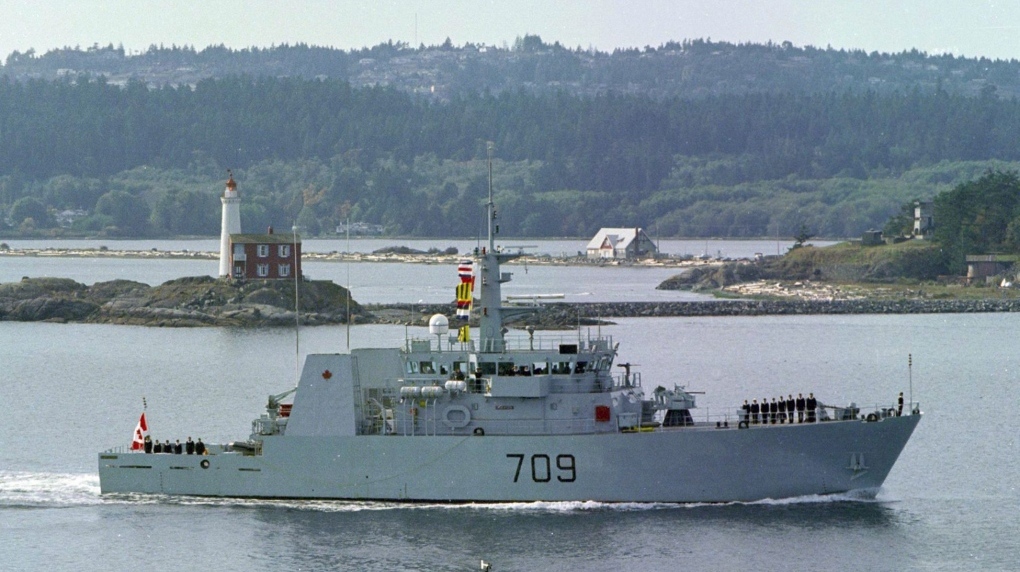Canadian warships return to Esquimalt, B.C., after three-month operation
 HMCS Saskatoon arrives in Esquimalt Harbour, B.C., sailing past Fisgard Lighthouse, in this undated DND handout photo. (THE CANADIAN PRESS / DND)
HMCS Saskatoon arrives in Esquimalt Harbour, B.C., sailing past Fisgard Lighthouse, in this undated DND handout photo. (THE CANADIAN PRESS / DND)
Two Canadian navy ships returned to their homeport in Esquimalt, B.C., on Thursday following their participation in Operation Caribbe, a counter-narcotics mission led by the U.S.
During their three-month deployment at sea, the HMCS Saskatoon and HMCS Yellowknife were called to 21 cases of potential illicit drug activity, and seized and destroyed roughly 872 kilograms of cocaine, according to the Department of National Defence.
The two warships sailed about 33,874 nautical miles and visited four countries during their patrols in the eastern Pacific Ocean.
One notable incident occurred just two weeks after the ships were deployed, when crewmembers helped intercept and destroyed about 800 kilograms of cocaine.
"I’m proud of the work carried out by the sailors who took part in Operation Caribbe on HMC Ships Saskatoon and Yellowknife these past three months," said Lt.-Commander Nadia Shields, task force commander, in a statement.
"Their contribution to this U.S.-led counter-narcotics operation in the East Pacific Ocean has ensured that approximately 872 kilograms of cocaine will not make it to our streets and harm Canadians," she said.
Operation Caribbe launched in November 2006. Since then, Canadian navy and air force members have helped disrupt or seize the shipment of more than 120 tonnes of cocaine, according to the Department of National Defence.
CTVNews.ca Top Stories

Expert warns of food consumption habits amid rising prices
A new survey by Dalhousie University's Agri-Food Analytics Lab asked Canadians about their food consumption habits amid rising prices.
opinion The special relationship between King Charles and the Princess of Wales
Royal commentator Afua Hagan writes that when King Charles recently admitted Catherine to the Order of the Companions of Honour, it not only made history, but it reinforced the strong bond between the King and his beloved daughter-in-law.
Charlie Woods, son of Tiger, shoots 81 in U.S. Open qualifier
Charlie Woods failed to advance in a U.S. Open local qualifying event Thursday, shooting a 9-over 81 at Legacy Golf & Tennis Club.
Improve balance and build core strength with this exercise
When it comes to cardiovascular fitness, you may tend to focus on activities that move you forward, such as walking, running and cycling.
B.C. tenants evicted for landlord's use after refusing large rent increase to take over neighbouring suite
Ashley Dickey and her mother rented part of the same Coquitlam duplex in three different decades under three different landlords.
Mountain guide dies after falling into a crevasse in Banff National Park
A man who fell into a crevasse while leading a backcountry ski group deep in the Canadian Rockies has died.
MPP Sarah Jama asked to leave Ontario legislature for wearing keffiyeh
MPP Sarah Jama was asked to leave the Legislative Assembly of Ontario by House Speaker Ted Arnott on Thursday for wearing a keffiyeh, a garment which has been banned at Queen’s Park.
Here's why provinces aren't following Saskatchewan's lead on the carbon tax home heating fight
After Prime Minister Justin Trudeau said the federal government would still send Canada Carbon Rebate cheques to Saskatchewan residents, despite Saskatchewan Premier Scott Moe's decision to stop collecting the carbon tax on natural gas or home heating, questions were raised about whether other provinces would follow suit. CTV News reached out across the country and here's what we found out.
Ex-tabloid publisher testifies he scooped up possibly damaging tales to shield his old friend Trump
As Donald Trump was running for president in 2016, his old friend at the National Enquirer was scooping up potentially damaging stories about the candidate and paying out tens of thousands of dollars to keep them from the public eye.
































